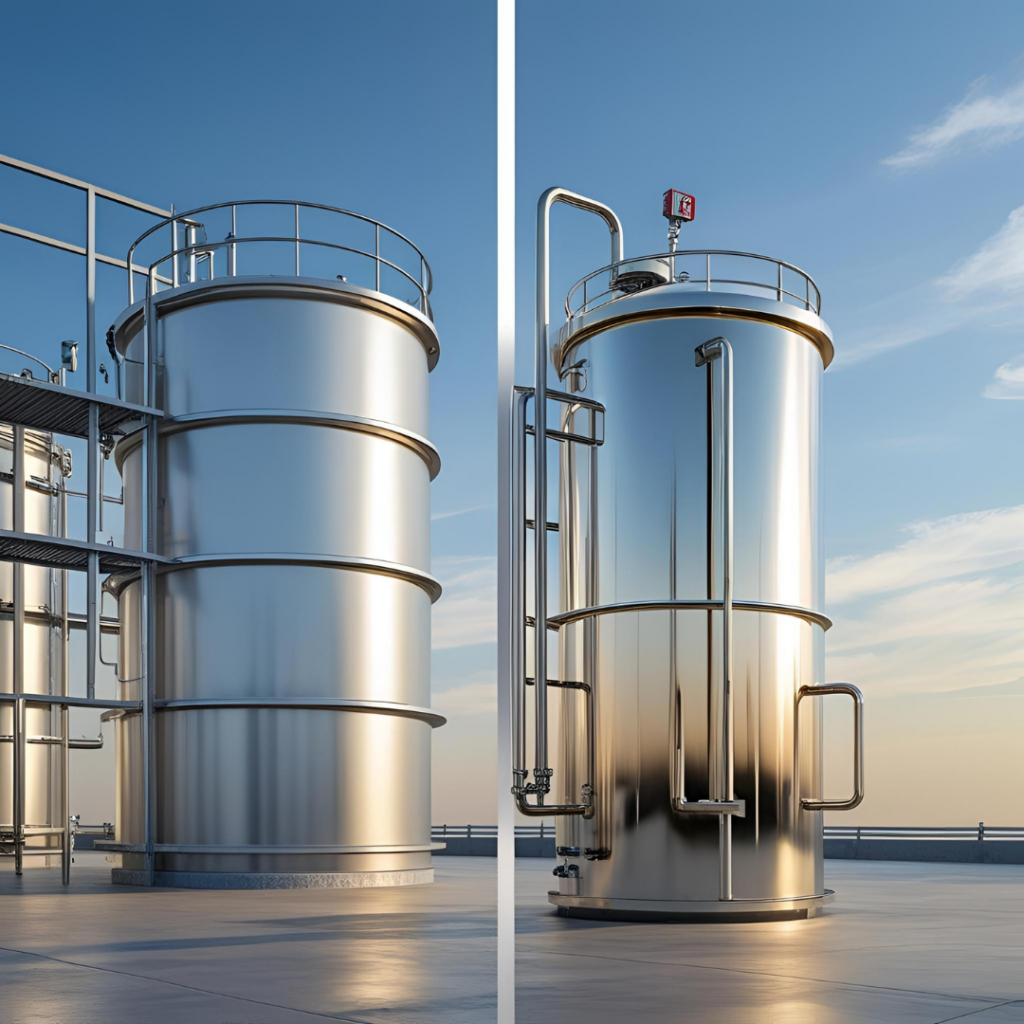The Importance of Fuel Storage
Fuel oil remains one of the most critical resources in the energy world. Proper storage of such a valuable and hazardous liquid is crucial for both environmental and economic reasons. An incorrectly selected tank can leak, polluting the environment and causing serious financial damage to your business.
Why is the Right Decision Crucial in Tank Selection?
An unsuitable tank not only means a lost investment but also a safety risk. Therefore, you must choose the type of tank that best suits your business’s needs. This is where the question of “single-walled” or “double-walled” comes into play.
What is a Fuel Storage Tank?
Basic Definition
Fuel storage tanks are industrial products used to safely store diesel, gasoline, and other flammable liquids. These tanks are typically used in above-ground or underground applications.
Areas of Use
Industrial Use
Fuels used as energy sources in factories are stored in these tanks.
Agricultural and Logistics Purposes
It is widely preferred in large-scale fuel consumption areas such as agricultural machinery and truck fleets.
Single Walled Fuel Storage Tanks
Building Features
Single-wall tanks are manufactured from single-layer steel. Their simple construction makes them cost-effective.
Advantages
- It is less costly.
- It is easy to install.
- Ideal for short-term use.
Disadvantages
Sealing Problems
The risk of leakage increases as a result of cracks and rust that may occur over time.
Environmental Risks
Fuel leakage into the environment can contaminate soil and water resources.
Double Walled Fuel Storage Tanks
What is Double Wall Design?
It consists of two interlocking layers. The inner tank stores the fuel, while the outer wall acts as a second layer of protection against leaks.
Security and Durability
In case of a leak in the inner tank, the outer wall prevents this leak and the system warns the user with an alarm.
Leak Detection and Isolation
Sensors located between the two walls instantly detect leaks, preventing environmental disasters.
Why Is It More Preferred?
Long life, low maintenance risk and high safety standards make double walled tanks the first choice today.
Differences Between Single Wall and Double Wall Tanks
Structural Differences
- Single wall tank: Single layer steel structure
- Double walled tank: Two-layer, insulated structure
Comparison in Terms of Security
Double-walled tanks greatly reduce the risk of environmental accidents.
Long-Term Cost Analysis
Although it may seem like a high cost at first, double-walled tanks are more economical in the long run as they reduce maintenance and possible accident costs.
Material Selection: Why Stainless Steel?
Advantages of Stainless Steel
- High corrosion resistance
- Heat resistance
Hygienic structure - Aesthetic appearance
Corrosion Resistance
Stainless steel tanks provide maximum resistance to corrosion, especially in humid environments.
Asinoks’ Quality Standards
asinoks.com makes a difference with the use of stainless steel that complies with DIN and ISO standards.
Production Capacity and Solutions of asinoks.com
Production Process
Precision cutting with CNC machines and high-strength joining techniques with TIG welding are used.
Custom Design Tank Manufacturing
Products that are completely suitable for your business are designed with size, volume and connection options specific to your needs.
Field Applications and Installation Services
Asinoks not only produces, but also supports you throughout the installation and commissioning process.
Legal Regulations and Standards in Fuel Tanks
Legislation in Turkey
Production must be carried out in accordance with the regulations determined by EMRA and the Ministry of Environment.
CE and ISO Certificates
Asinoks products are CE marked and ISO 9001 certified.
Environmental Impact Reports
Reporting and monitoring solutions are offered for environmentally sensitive systems.
Installation and Maintenance Tips
Things to Consider During Installation
The tank floor must be flat, solid and have a proper drainage system.
The Importance of Periodic Maintenance
Sensor checks, leak tests and surface checks should be done regularly.
Common Mistakes and How to Avoid Them
Not Choosing the Proper Tank
Choosing the wrong tank for short-term savings is detrimental in the long run.
Inadequate Care
Lack of maintenance multiplies the risk of leaks.
Failure to Comply with Security Protocols
For this reason, hazards such as fire and explosion can occur frequently.
Storage Systems of the Future
Smart Sensors and Automation
Leaks can be detected instantly with automatic warning systems.
IoT Based Monitoring
Remote control and reporting via mobile devices is now possible.
Conclusion and Recommendations
When choosing between single-wall and double-wall fuel storage tanks, it’s essential to consider safety, durability, and long-term costs. If you’re looking for a solution that will provide long-term, trouble-free service for your business, double-walled stainless steel tanks are definitely the right choice. At asinoks.com, we’re here to provide you with customized solutions and top-quality service.
Frequently Asked Questions (FAQ)
- In which cases are single wall tanks preferred?
It is preferred for short-term and low-budget projects, but security measures must be taken. - How to detect leaks in double walled tanks?
Thanks to the sensor system between the two walls, leaks are detected immediately. - How durable are stainless steel tanks?
It can be used for up to 30 years when properly maintained. - How often should fuel tanks be maintained?
It is recommended to have it checked by expert teams at least once a year. - What certificates do Asinoks products have?
It has internationally valid quality certificates such as CE and ISO 9001.
Stainless Steel Jacketed Tank Click here for detailed information!


